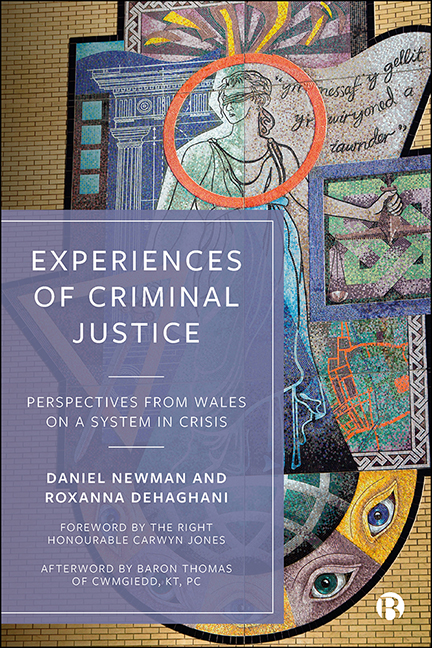Book contents
- Frontmatter
- Contents
- List of Figures and Tables
- Foreword
- Acknowledgements
- 1 Why Wales?
- 2 A System in Crisis
- 3 The People and Their Experiences
- 4 Criminal Justice in Its Place
- 5 Pressures of Practice
- 6 Criminal Justice Relationships
- 7 Navigating the Criminal Justice System
- 8 Doing Criminal Justice Differently
- Afterword
- References
- Index
Foreword
Published online by Cambridge University Press: 15 September 2022
- Frontmatter
- Contents
- List of Figures and Tables
- Foreword
- Acknowledgements
- 1 Why Wales?
- 2 A System in Crisis
- 3 The People and Their Experiences
- 4 Criminal Justice in Its Place
- 5 Pressures of Practice
- 6 Criminal Justice Relationships
- 7 Navigating the Criminal Justice System
- 8 Doing Criminal Justice Differently
- Afterword
- References
- Index
Summary
England and Wales is a strange legal jurisdiction. It encompasses two countries, one of which is far larger than the other and is often assumed to speak for the other. It is the only jurisdiction in the common law world with two parliaments that make laws within it, but only one parliament has the ability to enforce not just its own laws, but the laws of the other parliament as well. Legislatures in England, Scotland and Northern Ireland control their countries’ legal systems. Not Wales.
Whenever new parliaments are established, it is almost universally the case that they are given legal jurisdiction over their own laws. Wales is the exception; it has the only parliament that has no right to enforce its own laws, that right having been held on to by Westminster. We still have the imaginary country of ‘Englandandwales’ when it comes to the law. We have ‘national’ organizations such as the ‘National Probation Service’, which covers this imaginary country. Too often ‘andwales’ is forgotten. Little attention is given to effects of justice policy by decision makers in London who are not familiar with Wales and its needs.
I practised law throughout the 1990s and remember Crown Courts at Haverfordwest, Carmarthen and even Lampeter (although this only sat for a fortnight every year and was kept open by the efforts of the late Judge Dewi Watkin Powell). There were Magistrates’ Courts at Gowerton, Ystradgynlais, Fishguard and Bridgend, to name a few. Not long before I started to practise there had been courts in smaller settlements such as Mathry and Eglwyswrw. All these courts have gone and the centuries-old practice of justice coming to the people has been discarded by successive governments in favour of forcing people to travel many miles to attend court.
Nowhere is this more obvious than in rural Wales. Courts can be more than 30 miles away from people's homes, in areas where public transport, away from the main arteries, is infrequent. One court seems to do for entire rural counties. In addition, the legal aid reforms of recent years have led to ‘advice deserts’ in much of the country where people cannot even access legal advice locally.
- Type
- Chapter
- Information
- Experiences of Criminal JusticePerspectives from Wales on a System in Crisis, pp. v - viPublisher: Bristol University PressPrint publication year: 2022



